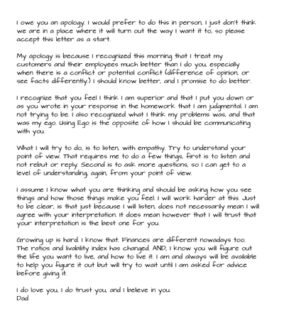The Debate
This past holiday we had an issue come up during what should have been a wonderful meal. One of our sons was talking about how hard it is these days for young people to become self-sufficient. I could see in his demeanor that he truly believed that his generation (Millennials) have it so much harder than the Gen-X (his siblings) or Boomers (his parents). He cited sources easily found on the internet that talk about wage disparity and affordability indexes.

I countered with some “facts’ of my own. This included that the minimum wage was $1.30 an hour when I first started working in 1973, compared to the $7.25 my son earned when he started working at age 16. I know this is a bad argument since nobody can move out on their own while making minimum wage. He noted the rate of inflation between these two rates, as well as the cost of an apartment when I first moved out, and what it would be for him now.
This debate went back and forth for over 30 minutes. He got heated, used foul language, and went on to give examples of how my life was easier than his. Meanwhile, I kept calm and just stated the “facts.” Most of the points I made were to defend my generation, and the hard work it took for me to succeed. I thought I was trying to make points that would keep him from taking a defeatist or victim mentality. I wanted him to know that success takes hard work and that he too could get there with the right mindset and effort.

The Fallout
I wish I could call this exchange a conversation, but honestly, it was an argument. The debate ended with him being so frustrated that he wanted to stop talking and leave the restaurant. We got home, went to our separate rooms, and he and my wife started texting back and forth. He first sent texts that reinforced his argument. Later texts turned to sadness because we were so stubborn and would not listen. I found out that he felt that we were not only stubborn but also stupid. Worse than that, we made him feel as though we don’t think he works hard enough. In the end, this is not even close to what we were “saying.”
From my point of view, I did hear his arguments. But, as soon as he made a point, I countered with some brilliance that went on to debunk and discredit his view. I felt good about my methods because I kept calm and never raised my voice, even when he made it personal. I was convinced that this young man was so angry he would never get his point across, or allow others to hear his point of view. The methods he was using, like vague claims, a loud voice, and cussing and hostility would never allow anybody to see his point. Even though I tried not to show it, I was angry. I was disappointed in my son because he had not applied any of the lessons on conflict or effective communications that I teach to my corporate clients.
Ego Gets in the Way
The next morning I went down to the beach to paddle board and do some reading on the sand, a ritual I try to do often. I picked up a book that was just recommended to me. The recommendation came from a new client and friend, who I believed recommended it because she appreciated my teachings and thought I would like it. The name of the book is Ego is the Enemy, written by Ryan Holiday. It did not take long for me to recognize that this book was not just recommended to me, but for me. Intentionally or not, the message became clear. My ego had gotten in the way of my teaching, and more importantly, it got in the way of my relationship with my son.
While at the beach, I started to see the hypocrisy between what I teach and the approach I took with my own son. In my coaching business, I teach others how to use conflict effectively, with seminars on communication, conflict, and negotiation. I preach the concept of Listen to Understand, which is popularized by Steven Covey, in The 7 Habits of Effective People. This practice provides several benefits, the most important of which is that people need to be felt, which Dr. Mark Goulson talks about in his book Just Listen.
Listen to Understand
My own teaching suggests that when people feel felt, several things happen. First, is that they soften their approach. I highly doubt my son would have felt the need to raise his voice or use foul language if he felt we listened to understand his frustrations. Secondly, when the amygdala is not firing so hard it’s easier for others to listen intently and hear counterarguments. If we’d just allowed him to vent, to feel felt, and to feel loved, these counter-arguments may not have been made at all. If I had been at my best, I would have just listened.
I still believe that I do not want my son going through life with a victim mentality. He needs to see that there is a way to succeed in today’s world. It’s my goal to inspire him to keep searching, to find his way, and be happy. I’m hopeful that he can learn how to make his points and work through conflict. With effective communication, he can turn conflict into a dialogue and benefit from the experiences of others. That night at the restaurant was not the place for this to happen, and I certainly did not model the process that I want so badly for him to learn.
Finding What We Want
I was disappointed in myself. I’m a teacher of effective communication, and yet I could not even practice it within my own family. Always quick to defend my positions, I used counter-arguments that thoroughly pissed him off in the process. I created a large gap in the relationship that I want with my boy. That morning at the beach, I recognized that my ego got in the way. I asked myself the questions we talk about in our Effective Communications course. These questions were so eloquently posed in the book Crucial Conversations.
- What is it that I want? In this case, I wanted to ensure my son did not end up with a victim mentality.
- What is it I want for him? To know that most young people go through this struggle. There is a positive outcome and he will succeed.
- What is it that I want for the relationship? For my son to be able to talk to me about his life, his struggles, and successes. For us to be close.
When I went through these questions I realized that I should have asked them the night before. If I had, I would not have failed when I got to the fourth question:
- Is what I am doing going to allow me to achieve any of the three answers above?
Well, it certainly did not that night. But, all was not lost, I could recover! I took the steps I felt were needed for that recovery. When I got home from the beach, I wrote my son a letter and left it in his room. Normally I believe that when there is a high potential for conflict, a face-to-face discussion is important. In this case, I felt the letter would have more impact. He would know that it came from my heart. It would also give him time to think and then respond, instead of catching him off guard.
Moving Forward
I am happy to report that my letter was well received. My son came into my room and thanked me, and gave me a hug. While I may not have made any progress with the first two questions, the third question was much more important to me. My apology went a long way towards allowing our next conversations, which is what I want for our relationship. I’m also now committed to working harder to utilize my teachings within our home. I don’t know if our future conversations will be about victimization, or how my son can create his own life plan. I do know that we will be able to have important conversations in the future. He now feels felt, and that I will try to understand him.
Apply Effective Communication to Work and Home
During my courses, it often amazes me when participants talk about having different personalities at work and at home. I always like to challenge them by asking which personality they like better. Is the home or work personality more effective at getting them what they want? Sometimes they say they are better at work (that is clearly me in this scenario), and sometimes they say at home. We need to ask ourselves, “Why won’t the better personality won’t work in both situations?” I try to teach that being your better self will work at home and at work. They should give it a try and see what happens.
The title Doctor, Heal Thyself was chosen as a reminder to use my own best practices. I believe this article is a form of journaling, which will help reinforce the lessons I need to employ. Both at home and at work, the communication methods that I preach, and the framing of conflict method that I believe in, can improve lives. It’s astonishing that I had to go paddleboarding and read a book before I could see what I should have known all along. What I know to be true is that we need to start with just listening, and always listen to understand. My ego is truly the enemy. It is so important to ask myself if what I’m doing is going to get me what I really want.


